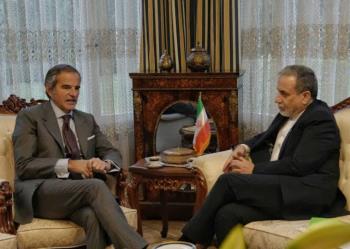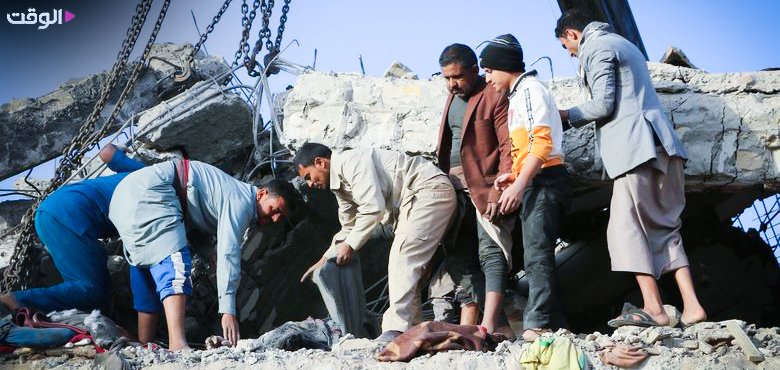Alwaght- In a heinous new crime, the Saudi-led Arab coalition launched deadly airstrikes killing civilians and leaving a new black stain on its seven-year record of crimes against the humanity in Yemen.
On Friday morning, Saudi warplanes bombed a makeshift prison in Sa'ada province in northwestern Yemen, killing and injuring dozens, reported local media. The fate of many victims under the rubble remains unknown.
There were more than 2,000 Yemeni and foreign prisoners in the prison. It served also as a camp for Africans heading to other countries through Yemen.
Figures vary on the number of people killed and injured in the airstrike. Yahya Shayem, director of the health department in Sa'ada, said about 150 people had been killed and injured and taken to hospitals in the province, and that the death toll was "rising." The province is facing a severe shortage of medical equipment, he said.
A few hours after the attack, Al-Masira news network on its Telegram account reported that initial statement suggested 140 of the prisoners were killed and injured.
Sa'ada governor said the hospitals of the region were full. Doctors Without Borders said the hospitals admitted "around 200" injured people. "The hospitals cannot admit more," the network reported citing DWB.
According to Saudi coalition sources, it has carried out more than 70 attacks in various provinces in the past few hours.
The biggest victims of the airstrikes by the Saudi-Emirati coalition continue to be civilians, with the Children's Rescue Initiative saying that three children and more than 60 adults were reportedly killed in airstrikes in Yemen on Friday. The children were killed by missiles in port city of Hudaidah.
Since a few weeks ago, the Saudi alliance claimed the port was a threat to shipping and it was used to smuggle arms to Yemen. Hudaidah port is the sole lifeline for Yemenis under all-out Saudi blockade since 2015. Humanitarian aids are mainly imported to the country from this artery. Ansarullah revolutionary movement, the key party resisting the Saudi aggression, has repeatedly rejected the claims about misuse of the port and even expressed readiness to accept international supervision in the port to prove Saudi Arabia allegations false and meant to justify the inhumane attacks and siege.
Condemnation of the attacks and promises of retaliation
Yemenis on Friday and following the coalition's recent blind airstrikes that are mainly driven by successive defeats in the war, particularly the seizure of the UAE aggressor warship, and successful missile and drone operations deep in the UAE, held demonstrations in the capital Sana'a and other Yemeni cities condemning the Arab coalition's bombardment.
Mohammed Abdel Salam, the spokesman to Ansarullah and the chief peace negotiator, in a reaction to the attack in a Twitter post vowed retaliation and said: "The killing of prisoners in Sa'ada prison, civilians in Hudaidah and Sana'a, and the attacks on civilian facilities by the aggressors do not bring the [Yemeni] people to their knees, nor do they break their resolve….These crimes will make our nation respond with full power and in any possible way."
The recent drone and missile operation deep into the UAE, which shocked Abu Dhabi, came after several initial warnings to the Emirati rulers to withdraw their forces from the war. Now, with Sana'a threatening to retaliate, it remains to see where in the depths of the UAE or Saudi Arabia the missiles and drones would attack. So, the bombardment not only did not intimidate the Yemeni leaders but also gave a boost to their spirit of resistance and determination to win.
Attacks on civilians an admission of defeat
The Saudi coalition is brutally killing Yemeni civilians every day while it entered Yemen war quagmire seven years ago with a false promise to restore peace and stability.
The aggression has left tens of thousands dead and millions displaced, with the UN calling it the worst humanitarian crisis in the world.
According to the UN, the war killed 377,000 people, directly and indirectly, by the end of last year.
With such a black record, not only has the Saudi coalition failed to show a legitimate face of its aggression against Yemen on the international stage but also more importantly in the field of developments whatever Riyadh and Abu Dhabi feared of, including Yemen transformation into another stronghold of the Axis of Resistance— including Iran, Syria, Iraq, Lebanon, and Palestine— has come to reality.
The Saudis are desperately launching media propaganda and attacks on the civilians to evade the reality of their defeat in the war while over the past years Ansarullah has managed to gain remarkable capabilities to develop and manufacture weapons with a purely domestic expertise.
In late March 2020, the Yemenis announced that the most prominent missile that had entered service in the past five years were Qaher, Burkan, Badr, Quds 1, Nakel, Qassim, and Zulfiqar. In early March 2021, the Qassem 2 and Quds 2 long-range cruise missiles were unveiled, as well as new models of drones called the Wayed and Samad 4.
Yemeni media report some of these missiles have a range of 700 to 1,500 kilometers– a reality nightmarish to the Saudi and Emirati leaders.
The so-called "self defense" war has actually exposed their countries to greater dangers than seven years ago.
New America plot and the need for international community response
Following last week's Ansarullah operation in Abu Dhabi, the UAE has called for the movement to be re-added to the US terrorism blacklist.
President Joe Biden's administration says it may re-blacklist Ansarullah. This American threat bears signs of a Washington conspiracy to punish Yemenis collectively and cut the way of the trivial amount of humanitarian aids entering Yemen.
Since Ansarullah controls the government in the areas where the vast majority of Yemenis live, naming the group as a terrorist group would mean putting tens of millions of people under a more severe siege than they have ever experienced. If that happens, it could send to preventable death of famine and disease hundreds of thousands and possibly millions of people.
On its first anniversary, the Biden administration, contrary to his campaign-time promises, not only failed to pressure the Arab alliance to end the war but also followed in footsteps of the previous administration in selling arms to Riyadh and Abu Dhabi.
Meanwhile, the blind Saudi-Emirati bombardment and Western-assisted systemic massacre of the civilians through sanctions and siege are a stain on the conscience of international community and sham Western advocates of human rights.



























